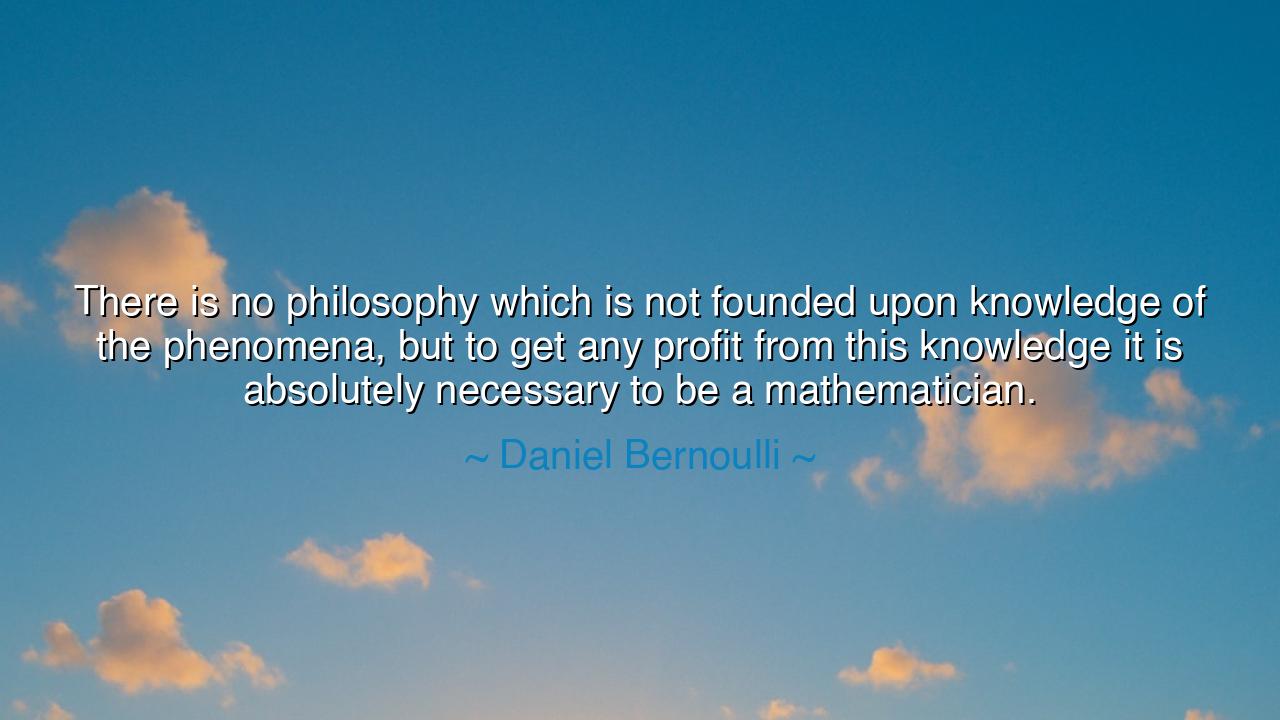
There is no philosophy which is not founded upon knowledge of the
There is no philosophy which is not founded upon knowledge of the phenomena, but to get any profit from this knowledge it is absolutely necessary to be a mathematician.






"There is no philosophy which is not founded upon knowledge of the phenomena, but to get any profit from this knowledge it is absolutely necessary to be a mathematician." Thus declared Daniel Bernoulli, heir to a dynasty of mathematicians, a man whose mind probed the hidden laws of motion, fluids, and chance. His words are not the musings of pride, but the distillation of a truth learned through labor: that to understand the world we must first observe its phenomena, but to master its truths and put them to use, we must wield the language of mathematics.
The meaning of this teaching is both stern and luminous. Philosophy begins with the contemplation of the visible world: the rising of the sun, the fall of rain, the flight of birds, the arc of the stars. Yet if one stops at mere observation, one remains a poet of nature, not its interpreter. To move beyond wonder into mastery, one must discern patterns, ratios, laws—and these are written not in speech, but in numbers. Thus, Bernoulli proclaims that the profit of knowledge is gained only when clothed in the garment of mathematics, for it alone converts scattered visions into universal truths.
History bears testimony to this law. Think of Isaac Newton, who did not merely marvel at the apple’s fall, but clothed gravity in equations that bound the heavens and the earth under one law. His genius lay not only in seeing the phenomena, but in possessing the mathematical power to describe them with precision. Without numbers, his insight would have remained a fleeting thought; with them, it became a pillar of modern science, unshaken even centuries later.
Consider also Bernoulli himself, who gave to the world the principle of fluid dynamics, a law that governs the flight of birds and the soaring of planes, the beating of the human heart and the flow of rivers. He observed the phenomena of moving air and liquid, but it was his mathematics that revealed the hidden law: that pressure decreases as velocity increases. Without his calculations, men would still have marveled at the flight of birds; with them, men learned to fly themselves. Here is the profit of knowledge—gained only when numbers give form to wonder.
Yet Bernoulli’s wisdom is not only for scholars of physics, but for all seekers of truth. The ancients taught that philosophy is love of wisdom, and wisdom requires both vision and discipline. To see the world is the gift of the eyes, but to understand it is the labor of the mind. Mathematics is not merely a tool of scientists, but a discipline of clarity, a training in rigor, a path that teaches us to distinguish the eternal from the fleeting. Without it, philosophy risks dissolving into vagueness; with it, philosophy gains bones and sinew, becoming not only noble but useful.
The lesson for us is clear: do not be content to marvel without measure, nor to observe without order. If you seek truth, embrace both phenomena and mathematics. Study the world with eyes wide open, but also train the mind to count, to calculate, to test, to prove. Do not fear the difficulty of numbers, for they are the alphabet of the universe, the language in which creation was written. To reject them is to blind oneself to half the light of truth.
Practical action follows. Learn to see patterns in all things: in nature, in society, in your own soul. Do not flee from mathematics, but approach it as a sacred discipline that sharpens the intellect and strengthens the spirit. Whether you are a philosopher, an artist, a scientist, or a leader, let your thoughts be grounded not only in vision but in measure. For wisdom without form is a dream, but wisdom bound by number becomes a law that endures.
So I say to you, children of tomorrow: heed the words of Daniel Bernoulli. Observe the phenomena of the world with reverence, but do not stop there. Clothe your insights in the garments of mathematics, and your vision will become law, your wonder will become power, and your philosophy will not merely sing, but build. For in numbers lies not coldness, but clarity; not prison, but freedom—the freedom to know, to create, and to shape the destiny of mankind.






AAdministratorAdministrator
Welcome, honored guests. Please leave a comment, we will respond soon